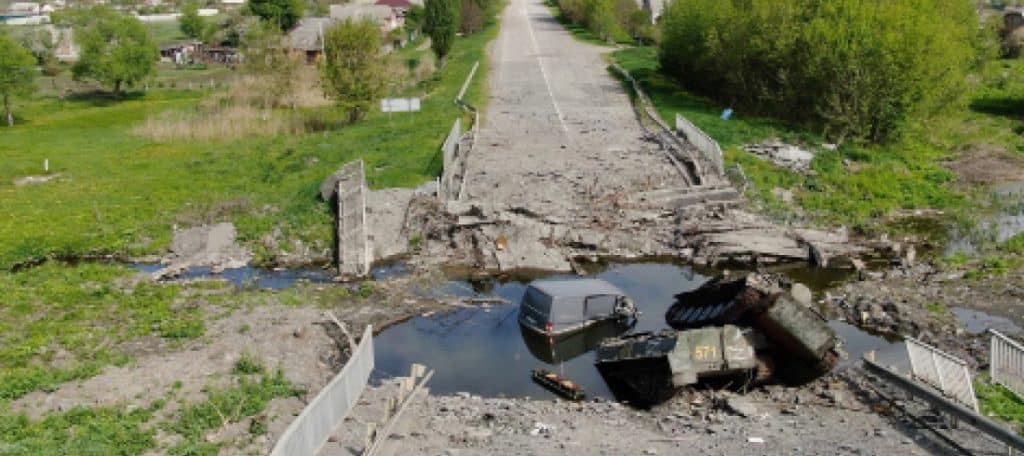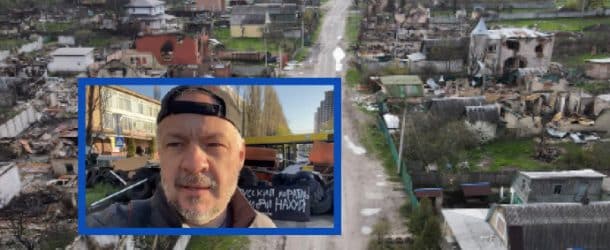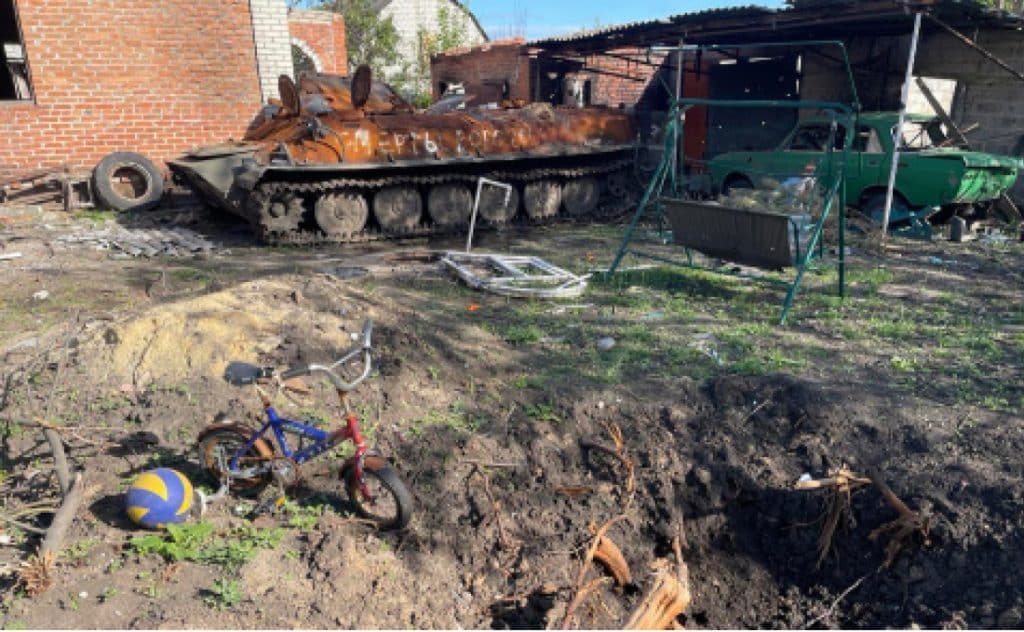Local Filmmaker Wants To Make A Difference
By Kerri Cooke
The war in Ukraine has been on everyone’s mind, for humanitarian reasons and because of supply chain issues closer to home. From gas prices to friends from Ukraine, we can find something or someone in our lives affected by the Russian invasion.
One local man, Justin Roberts, is in Ukraine right now hoping to make a documentary but also “make a difference.”
Roberts married a woman from Sulphur and the couple have spent half of their 20 married years in the area.
You may know Roberts from his previous documentary No Greater Love, shown widely in SWLA. Roberts made No Greater Love during his 2010-‘11 deployment to Afghanistan. He couldn’t carry a weapon as an Army chaplain, but he could carry a camera.
Roberts documented his time in the No Slack Battalion. Soldiers struggled with battle, loss and regret and are seen in postwar interviews, as well. The title of the documentary, “No Greater Love,” is in reference to John 15:13. The documentary won nine awards at various film festivals in the United States and was even streamed at the White House.
The next project Roberts set his sights on was documenting the destruction brought on by Hurricane Laura and the ensuing humanitarian aid. (Roberts lost his home in Hurricane Laura.) He calls his team the Do Good Army.
Do Good Army
When I contacted Roberts about the documentary he is making about the war in Ukraine, he was in Warsaw, Poland, about to cross into Lviv, Ukraine. I had to download a messaging app on my phone since Roberts had received a briefing not to use Facebook Messenger or WhatsApp because they are vulnerable to hacking.
When I asked Roberts what made him interested in making documentaries, he told me, “I have always had a passion for filmmaking, even from a young age. What I love about documentaries is that they help people to understand and empathize with others. And then, on that bridge of empathy, we can mobilize people to make a difference.”
When I asked why a documentary in Ukraine, Roberts responded, “Right now Ukraine is experiencing a tremendous amount of suffering in ways that most people cannot understand. Our goal is to reveal what is going on, how it is affecting people and how we can help. I’m a former soldier and I’ve put together a documentary in a war zone before, so this isn’t my first rodeo. We understand how to navigate a battlefield and tell the stories in a personal way. But, most importantly, we intend to make sure that these stories have a positive impact for people in that community. Our goal isn’t to just make a movie, it is to make a difference.”
Roberts plans to be in Ukraine for a total of five months. But as the situation in the country is very fluid at the moment, this estimate could change. As long as he can make a difference in a dire situation, Roberts seems to be willing to go into areas other people deem too dangerous in order to get the message across to Americans and the world that Ukrainians are in serious need of aid.
Another man helping Roberts with the mission is Samuel Cook. You might have seen him on KPLC News shortly after the war in Ukraine began. He is a local and a West Point graduate who lived in Ukraine for four years while heading up a software company. He fled Ukraine with his Ukrainian fiancée to Lake Charles and is executive producer of the new documentary.
However, Cook is working stateside and aiding in connecting Roberts with people he knows who are still residing in Ukraine. Hank Barbe is also helping Roberts on the ground in Ukraine.
Entry Into Ukraine
On April 23, Roberts arrived in Lviv, Ukraine, to missile alerts and reports of an apartment bombing in Odessa. He later arrived in Kyiv.
Roberts emphasized, “The destruction is massive. I’ve been to war in Afghanistan and witnessed the carnage of Hurricane Laura and Delta. This is a combination of both and in a much more horrific way. As I walked through the areas of destruction, one of the first questions that struck me was, where are the helpers?
“After Laura we had dozens of organizations mobilize to help us with food and support. That isn’t happening here, or at least not at the moment. There are many organizations in the safe zones, but I didn’t witness any where I went.”

the remains of a destroyed Russian convoy ON MAY 13. In the rubble was riot gear and rubber bullets.
Roberts videoed himself at the largest checkpoint in Ukraine. The road in Kiev was blockaded with lots of tires and various other objects to block the Russians from entering the city. There were hedgehogs (the military tool not the animal) lining the road as well.
What struck Roberts the most was the presence of the blockade and military trenches right across from a civilian apartment complex. People were living alongside battlements. People were living in a warzone with the potential for heavy fighting.
Roberts also mentioned an old lady he spoke to. She “survived the assault of the Nazis in WWII as a baby. She was born into war and it seems that her last years will end with war as well.”
Kiev And Kharkiv
While Roberts was in Kiev, he witnessed bombed out buildings and dogs living amid the rubble.
Air attacks were still ongoing in Kiev, even as the Russian army had moved out. Roberts said air attack warning alerts go off five to ten times a day. An apartment complex was bombed during Robert’s time there (around April 29). It killed a number of civilians and a journalist. The warnings are for civilian purposes and don’t reflect what’s happening on the front lines.
The suburbs surrounding Kiev held even darker secrets. Including mass civilian casualties and evidence of war crimes. Roberts says every home he saw had been targeted by Russian fire. He met a survivor of the violence, an old lady caring for a baby.
Roberts shared a TikTok video of a memorial wall with pictures of the soldiers Ukraine has lost since the Crimean War in 2014. Roberts emphasized that to the western world, the war for Ukraine just began, but for the Ukrainian people, it has been going on for eight years. As he walked past hundreds of pictures, he said, “The wall is going to continue to get extended until this war comes to a conclusion. And the war is not going to come to a conclusion until the rest of the world steps up to it…”
One of Roberts’ and the world’s biggest complaints is about how the Russians are intentionally targeting civilians. Roberts came across a bombed-out apartment complex where he could see dinosaurs decorating an interior wall in a place where the outside walls of the building had been blown off. “I’m praying that this kid made it out of Ukraine before the attack. But I’ve seen many kids here in the city. With the dinosaurs on the wall, that tells me that the kid was roughly the same age as my son,” Roberts said.

Let me take a moment to recognize one of the members of our team, Steve Shkunda who took this incredible shot. The bridge was blown as the Russian’s were trying to flee. Steve was born in Ukraine but came to the states and served in the Marines as an Infantryman. After his service he became an actor and a filmmaker. Our journey through this battlefield and working on this film would be impossible without him and Hank Barbe making stuff happen.
It takes a team to make a film and I’ve got a group of combat veterans who also happen to be amazing artists to navigate this journey with. I’m deeply grateful.
– Roberts, on Facebook, May 14
Roberts compares how the American military operated in Afghanistan versus how the Russians are operating in Ukraine. He recalls a time in the No Slack Battalion when his fellow soldiers would not fire on a 14-year-old girl that they suspected had an IED concealed on her person because they couldn’t positively determine whether she was a regular civilian or a suicide bomber. The latter ended up being the case, and two soldiers were lost in the ensuing blast.
“Our military put forth every effort to protect civilians and we lost many lives in that effort; I performed the memorials for a few of them. Russia is doing the opposite. They’re directly attacking civilians,” Roberts said.
A shopping center in Kharkiv showed how ruthlessly civilian targets were attacked. All that was left of the buildings making up the shopping center were the metal beams, now twisted and broken, that formed the shell of the buildings. Everything else was burnt out. Roberts walked through and mentioned that coffee cups and children’s toys were in the rubble, a sign of “the humanity that was there when the attacks came.”
He continued, “I’m worn out from seeing the civilian targets. I’ve also witnessed the Russians hitting military targets, but that is the exception rather than the rule.
“You can’t walk past someone’s home without imagining them being there when the attack happened. You see a broken makeup mirror and think of a woman putting on her make-up. Coffee cups and a couple having coffee. Toys and kids playing. Our things tell a story. In this place it is happening at multiple levels.
“To be honest, I always pray that I won’t see kids’ toys in the blast sites because it hits me in a different way. But, with the apartments that have been hit, they’re usually there.”
Roberts also visited the site where a Russian convoy was blown up. The vehicles were burned out, glass was bent and metal even liquified before dripping and hardening on the pavement below. The Ukrainians were busy trying to salvage any parts they could from the vehicles to help fix their own. In addition to bullets and grenades, personal items, such as books, also littered the ground.
The Front Line
When Roberts was in the Donbas region, where much of the heavy fighting is currently happening, he stayed in a house turned into a military barracks. There was a missile system housed in the building along with soldiers.
“We’re at the front a few clicks from the Russian line. Anti-air [fire] rumbles overhead every few hours. We’re packed together in a small Soviet-era house. A Ukraine news channel talks about the war and plays their anthem every so often… Some of the guys are fighting to defend their freedom, others for revenge, some for both. You can tell which by their eyes and their tone. Like the rockets exploding above us, you see the blast and thunder follows.”
Roberts got to speak “with a commander who was from Crimea and Azerbaijan.” The two joked around with Roberts saying, “But I thought you guys were a bunch of Nazis.” The commander replied, “Yeah, we heard that too. Russians.”
As word continues to circulate that Russian troops had no idea what they were headed into when the war first began, Roberts surveyed a destroyed Russian convoy. The presence of rubber bullets and riot gear hint to the fact that, as Roberts said, “[The Russians] sincerely did not plan for Ukraine to fight. And now they are waking up to the reality that Ukraine is also going to win.”
Needs In Donbas
In Kharkiv, Roberts talks about the women and children sheltering in the subway. At the time, the civilians had been living there for two months. The subway is home for now, and children play in designated areas. Roberts said he expected to find people depressed by the loss and hardship they have and are going through, but he found it was the opposite. The shelters have just become a home with a big family.

Russia is directly attacking civilians. I’m praying that this kid made it out of Ukraine before the attack, but I’ve also seen many kids here in the city. With the dinosaurs on the wall that tells me that the kid was roughly the same age as my son.
– Roberts, on Facebook, May 3
The women usually have husbands fighting on the front lines and children. Roberts said they show “incredible unity, incredible camaraderie.” A community consisting of those in similar positions binds them together, and Roberts said the energy is hopeful.
However, there are still bombs coming into Kharkiv at times. Civilians line the streets, waiting in long food lines even though rockets and missiles are still incoming.
Roberts said, “We’ve seen a lot of journalists, but we haven’t seen a lot of the nonprofits at the front.” These vital agencies tend to be stationed in Lviv, a relatively safe city in eastern Ukraine, which has been largely spared the devastation that is evident in the east. However, Roberts emphasized that getting food into Kharkiv and the Donbas region is “critical.”
Some food is being “packed and pushed forward through the government,” but the need is massive, as the population of the city sat at close to 1.5 million before the war. One-fourth of those in Kharkiv are now homeless and have no way to make money, as the city is in shambles and the front line a stone’s throw away.
The Spirit Of Ukraine
When speaking about Ukraine, Roberts said it’s “a beautiful country” and is inspired by how hard its people are working for the democracy.
“Ukraine has a hard start, just coming out of communist poverty. But, what I’m witnessing is a generation of entrepreneurs: a golden generation that is willing to fight a war for independence…
“I don’t see trash on the streets. They spend time and money caring for their communities. Everywhere I look I see small businesses. They spend a good deal of time on aesthetics that make communities beautiful. It reminds me of Germany or Austria in a lot of ways, but with more of an entrepreneurial spirit.
“They haven’t been overrun yet by franchises, so you’ll find more unique restaurants and shops. They have most of the same kinds of stores as us, but a lot cheaper. A doctor here makes about a $1,000 a month, but that’s decent since most things, like food, don’t cost as much. You can get a fancy meal for around $12. A good latte for $1.
“Most of the people are friendly. They don’t typically greet you with a smile, but if you are nice they will smile quick. And, if you are a guest they will overfeed you. I think they assume you are starving and about to die. They’re just very hospitable…
“They are trying to build something beautiful. They want to build up their own country and are ambitious and hopeful about their future. They know if they become a puppet state to Russia that dream will die. And, like America in its beginning, they are willing to die for that dream.”
















Comments are closed.